- Home
- Fredric Brown
The Collection Page 5
The Collection Read online
Page 5
The screen went blank; Brander would be signalling the other scouters of his command.
Slowly, Carson set the controls for the return. Slowly, unbelievingly, he unstrapped himself from the seat and went back to get a drink at the cold-water tank. For some reason, he was unbelievably thirsty. He drank six glasses.
He leaned there against the wall, trying to think.
Had it happened? He was in good health, sound, uninjured. His thirst had been mental rather than physical; his throat hadn’t been dry.
He pulled up his trouser leg and looked at the calf. There was a long white scar there, but a perfectly healed scar; it hadn’t been there before. He zipped open the front of his shirt and saw that his chest and abdomen were criss-crossed with tiny, almost unnoticeable, perfectly healed scars.
It had happened!
The scouter, under automatic control, was already entering the hatch of the mothership. The grapples pulled it into its individual lock, and a moment later a buzzer indicated that the lock was airfilled. Carson opened the hatch and stepped outside, went through the double door of the lock.
He went right to Brander’s office, went in, and saluted.
Brander still looked dazed. ‘Hi, Carson,’ he said. ‘What you missed; what a show!’
‘What happened, sir?’
‘Don’t know, exactly. We fired one salvo, and their whole fleet went up in dust! Whatever it was jumped from ship to ship in a flash, even the ones we hadn’t aimed at and that were out of range! The whole fleet disintegrated before our eyes, and we didn’t get the paint of a single ship scratched!
‘We can’t even claim credit for it. Must have been some unstable component in the metal they used, and our sighting shot just set it off. Man, too bad you missed all the excitement!’
Carson managed a sickly ghost of a grin, for it would be days before he’d be over the impact of his experience, but the captain wasn’t watching.
‘Yes, sir,’ he said. Common sense, more than modesty, told him he’d be branded as the worst liar in space if he ever said any more than that. ‘Yes, sir, too bad I missed all the excitement....’
IMAGINE
Imagine ghosts, gods and devils.
Imagine hells and heavens, cities floating in the sky and cities sunken in the sea.
Unicorns and centaurs. Witches, warlocks, jinns and banshees.
Angels and harpies. Charms and incantations. Elementals, familiars, demons.
Easy to imagine, all of those things: mankind has been imagining them for thousands of years.
Imagine spaceships and the future.
Easy to imagine; the future is really coming and there'll be spaceships in it.
Is there then anything that's hard to imagine?
Of course there is.
Imagine a piece of matter and yourself inside it, yourself aware, thinking and therefore knowing you exist, able to move that piece of matter that you're in, to make it sleep or wake, make love or walk uphill.
Imagine a universe—infinite or not, as you wish to picture it—with a billion, billion, billion suns in it.
Imagine a blob of mud whirling madly around one of those suns.
Imagine yourself standing on that blob of mud, whirling with it, whirling through time and space to an unknown destination. Imagine!
IT DIDN’T HAPPEN
Although there was no way in which he could have known it, Lorenz Kane had been riding for a fall ever since the time he ran over the girl on the bicycle. The fall itself could have happened anywhere, any time; it happened to happen backstage at a burlesque theater on an evening in late September.
For the third evening within a week he had watched the act of Queenie Quinn, the show's star stripper, an act well worth watching, indeed. Clad only in blue light and three tiny bits of strategically placed ribbon, Queenie, a tall blond built along the lines of a brick whatsit, had just completed her last stint for the evening and had vanished into the wings, when Kane made up his mind that a private viewing of Queenie's act, in his bachelor apartment, not only would be more pleasurable than a public viewing but would indubitably lead to even greater pleasures. And since the finale number, in which Queenie, as the star, was not required to appear, was just starting, now would be the best time to talk to her with a view toward obtaining a private viewing.
He left the theater and strolled down the alley to the stage door entrance. A five-dollar bill got him past the doorman without difficulty and a minute later he had found and was knocking upon a dressing room door decorated with a gold star. A voice called out "Yeah?" He knew better than to try to push a proposition through a closed door and he knew his way around back-stage well enough to know the one question that would cause her to assume that he was someone connected with show business who had a legitimate reason for wanting to see her. "Are you decent?" he asked.
"'Sta minute," she called back, and then, in just a minute, "Okay."
He entered and found her standing facing him, in a brightred wrapper that beautifully set off her blue eyes and blond hair. He bowed and introduced himself, then began to explain the details of the proposition he wished to offer.
He was prepared for initial reluctance or even refusal and ready to become persuasive even, if necessary, to the extent of four figures, which would certainly be more than her weekly take—possibly more than her monthly take—in a burlesque house as small as this one. But instead of listening reasonably, she was suddenly screaming at him like a virago, which was insulting enough, but then she made the very serious mistake of taking a step forward and slapping him across the face. Hard. It hurt.
He lost his temper, retreated a step, took out his revolver and shot her in the heart.
Then he left the theater and took a taxi home to his apartment. He had a few drinks to soothe his understandably ruffled nerves and went to bed. He was sleeping soundly when, at a little after midnight, the police came and arrested him for murder. He couldn't understand it.
***
Mortimer Mearson, who was possibly if not certainly the best criminal attorney in the city, returned to the clubhouse the next morning after an early round of golf and found waiting for him a message requesting him to call Judge Amanda Hayes at his earliest convenience. He called her at once.
"Good morning, Your Honoress," he said. "Something gives?"
"Something gives, Morty. But if you're free the rest of the morning and can drop around to my chambers, you'll save me going into it over the telephone."
"I'll be with you within an hour," he told her. And he was.
"Good morning again, Your Judgeship," he said. "Now please take a deep breath and tell me just what it is that gives."
"A case for you, if you want it. Succinctly, a man was arrested for murder last night. He refuses to make a statement, any statement, until he has consulted an attorney, and he doesn't have one. Says he's never been in any legal trouble before and doesn't even know any attorneys. Asked the chief to recommend one, and the chief passes the buck to me on said recommendation."
Mearson sighed. "Another free case. Well, I suppose it's about time I took one again. Are you appointing me?"
"Down, boy," said Judge Hayes. "Not a free case at all. The gentleman in question isn't rich, but he's reasonably well-heeled. A fairly well-known young man about town, bon vivant, what have you, well able to afford any fee you wish to charge him, within reason. Not that your fee will probably be within reason, but that's between you and him, if he accepts you to represent him."
"And does this paragon of virtue—most obviously innocent and maligned—have a name?"
"He does, and you will be familiar with it if you read the columnists. Lorenz Kane."
"The name registers. Most obviously innocent. Uh—I didn't see the morning papers. Whom is he alleged to have killed? And do you know any of the details?"
"It's going to be a toughie, Morty boy," the judge said. "I don't think there's a prayer of a chance for him other than an insanity plea. The victim was a Qu
eenie Quinn—a stage name and no doubt a more valid one will come to light—who was a stripper at the Majestic. Star of the show there. A number of people saw Kane in the audience during her last number and saw him leave right after it during the final number. The doorman identifies him and admits having—ah—admitted him. The doorman knew him by sight and that's what led the police to him. He passed the doorman again on his way out a few minutes later. Meanwhile several people heard a shot. And a few minutes after the end of the show, Miss Quinn was found dead, shot to death, in her dressing room."
"Hmmm," said Mearson. "Simple matter of his word against the doorman's. Nothing to it. I'll be able to prove that the doorman is not only a pathological liar but has a record longer than Wilt-the-Stilt's arm."
"Indubitably, Morty. But. In view of his relative prominence, the police took a search warrant as well as a warrant for arrest on suspicion of murder when they went to get him. They found, in the pocket of the suit he had been wearing, a thirty-two caliber revolver with one cartridge fired. Miss Quinn was killed by one bullet fired from a thirty-two caliber revolver. The very same revolver, according to the ballistics experts of our police department, who fired a sample bullet and used a comparison microscope on it and the bullet which killed Miss Quinn."
"Hmmm and double hmm," Mearson said. "And you say that Kane has made no statement whatsoever except to the effect that he will make no statement until he has consulted with an attorney of his choice?"
"True, except for one rather strange remark he made immediately after being awakened and accused. Both of the arresting officers heard it and agree on it, even to the exact wording. He said, `My God, she must have been real!' What do you suppose he could possibly have meant by that?"
"I haven't the faintest, Your Judgeship. But if he accepts me as his attorney, I shall most certainly ask him. Meanwhile, I don't know whether to thank you for giving me a chance at the case or to cuss at you for handing me a very damned hot potato."
"You like hot potatoes, Morty, and you know it. Especially since you'll get your fee win or lose. I'll save you from making wasted motions in one direction, though. No use trying for bail or for a habeas corpus writ. The D.A. jumped in with both feet the moment the ballistics report came up heads. The charge is formal, murder in the first. And the prosecution doesn't need any more case than they have; they're ready to go to trial as soon as they can pressure you into it. Well, what are you waiting for?"
"Nothing," Mearson said. He left.
***
A guard brought Lorenz Kane to the consultation room and left him there with Mortimer Mearson. Mearson introduced himself and they shook hands. Kane, Mearson thought, looked quite calm, and definitely more puzzled than worried. He was a tall, moderately good-looking man in his late thirties, impeccably groomed despite a night in a cell. One got the idea that he was the type of man who would manage to appear impeccably groomed anywhere, any time, even a week after his bearers had deserted in midsafari nine hundred miles up the Congo, taking all his possessions with them.
"Yes, Mr. Mearson. I shall be more than glad to have you represent me. I've heard of you, read about cases you've handled. I don't know why I didn't think of you myself, instead of asking for a recommendation. Now, do you want to hear my story before you accept me as a client—or do you accept as of now, for better or for worse?"
"For better or for worse," Mearson said, "till—" And then stopped himself; "till death do us part," is hardly a diplomatic phrase to use to a man who stands, quite possibly, in the shadow of the electric chair.
But Kane smiled and finished the phrase himself. "Fine," he said. "Let's sit down then," and they sat down on the two chairs, one on each side of the table in the consultation room. "And since that means we'll be seeing quite a bit of one another for a while, let's start on a first-name basis. But not Lorenz, in my case. It's Larry."
"And make mine Morty," Mearson said. "Now I want your story in detail, but two quick questions first. Are you—?"
'Wait," Kane interrupted him. "One quick question ahead of your two. Are you absolutely and completely positive that this room is not bugged, that this conversation is completely private?"
"I am," Mearson said. "Now my first question: are you guilty?"
"The arresting officers claim that before clamming up, you said one thing: `My God, she must have been real!' Is that true, and if so what did you mean by it?"
"I was stunned at the moment, Morty, and can't remember—but I probably said something to that effect, because it's exactly what I was thinking. But as to what I meant by it—that's something I can't answer quickly. The only way I can make you understand, if I can make you understand at all, is to start at the beginning."
"All right. Start. And take your time. We don't have to go over everything in one sitting. I can stall the trial at least three months—longer if necessary."
"I can tell it fairly quickly. It started—and don't ask me for an antecedent for the pronoun it—five and a half months ago, in early April. About two-thirty A.M. on the morning of Tuesday, April the third, to be as nearly exact about it as I can. I had been at a party in Armand Village, north of town, and was on my way home. I—"
"Forgive interruptions. Want to be sure I have the whole picture as it unfolds. You were driving? Alone?"
"I was driving my Jag. I was alone."
"Sober? Speeding?"
"Sober, yes. I'd left the party relatively early—it was rather a dull bit—and had been feeling my drinks moderately at that time. But I found myself suddenly quite hungry—I think I'd forgotten to eat dinner—and stopped at a roadhouse. I had one cocktail while I was waiting, but I ate all of a big steak when it came, all the trimmings, and had several cups of coffee. And no drinks afterward. I'd say that when I left there I was more sober than usual, if you know what I mean. And, on top of that, I had half an hour's drive in an open car through the cool night air. On the whole, I'd say that I was soberer than I am now—and I haven't had a drink since shortly before midnight last night. I—"
"Hold it a moment," Mearson said. He took a silver flask from his hip pocket and extended it across the table. "A relic of Prohibition; I occasionally use it to play St. Bernard to clients too recently incarcerated to have been able to arrange for importation of the necessities of life."
Kane said, "Ahhh. Morty, you may double your fee for service beyond the call of duty,." He drank deeply.
"Where were we?" he asked. "Oh, yes. I was definitely sober. Speeding? Only technically. I was heading south on Vine Street a few blocks short of Rostov—"
"Near the Forty-fourth Precinct Station."
"Exactly. It figures in. It's a twenty-five-mile zone and I was going about forty, but what the hell, it was half-past two in the morning and there wasn't any other traffic. Only the proverbial little old lady from Pasadena would have been going less than forty."
"She wouldn't have been out that late. But carry on."
"So all of a sudden out of the mouth of an alley in the middle of the block comes a girl on a bicycle, pedaling about as fast as a bicycle can go. And right in front of me. I got one clear flash of her as I stepped on the brake as hard as I could. She was a teenager, like sixteen or seventeen. She had red hair that was blowing out from under a brown babushka she had on her head. She wore a light green angora sweater and tan pants of the kind they call pedal pushers. She was on a red bicycle."
"You got all that in one glance?"
"Yes. I can still visualize it clearly. And—this I'll never forget —just before the moment of impact, she turned and was looking straight at me, through frightened eyes behind shell-rimmed glasses.
"My foot was, by then, trying to push the brake pedal through the floor and the damn Jag was starting to slue and make up its mind whether to go end over end or what. But hell, no matter how fast your reactions are—and mine are pretty good —you can barely start to slow down a car in a few yards if you're going forty. I must have still been going over thirty when I hit her—i
t was a hell of an impact.
"And then bump-crunch, bump-crunch, as first the front wheels of the Jag went over and then the back wheels. The bumps were her, of course, and the crunches were the bicycle. And the car shuddered to a stop maybe another thirty feet on.
"Ahead of me, through the windshield, I could see the lights of the precinct station only a block away. I got out of the car and started running for it. I didn't look back. I didn't want to look back. There was no point to it; she had to be deader than dead, after that impact.
"I ran into the precinct house and after a few seconds I got coherent enough to get across what I was trying to tell them. Two of the city's finest left with me and we started back the block to the scene of the accident. I started out by running, but they only walked fast and I slowed myself down because I wasn't anxious to get there first. Well, we got there and—"
"Let me guess," the attorney said. "No girl, no bicycle."
Kane nodded slowly. "There was the Jag, slued crooked in the street. Headlights on. Ignition key still on, but the engine had stalled. Behind it, about forty feet of skid marks, starting a dozen feet back of the point where the alley cut out into the street.
"And that was all. No girl. No bicycle. Not a drop of blood or a scrap of metal. Not a scratch or a dent in the front of the car. They thought I was crazy and I don't blame them. They didn't even trust me to get the car off the street; one of them did that and parked it at the curb—and kept the key instead of handing it to me—and they took me back to the station house and questioned me.
"I was there the rest of the night. I suppose I could have called a friend and had the friend get me an attorney to get me out on bail, but I was just too shaken to think of it. Maybe even too shaken to want out, to have any idea where I'd want to go or what I'd want to do if I got out. I just wanted to be alone to think and, after the questioning, a chance to do that was just what I got. They didn't toss me into the drunk tank. Guess I was well enough dressed, had enough impressive identification on me, to convince them that, sane or nuts, I was a solid and solvent citizen, to be handled with kid gloves and not rubber hose. Anyway, they had a single cell open and put me in it and I was content to do my thinking there. I didn't even try to sleep.

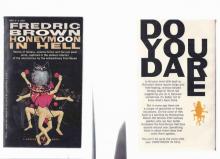 Hall of Mirrors
Hall of Mirrors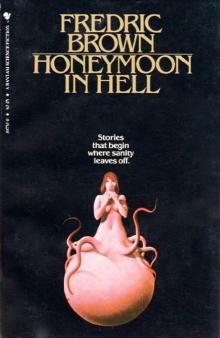 Honeymoon in Hell
Honeymoon in Hell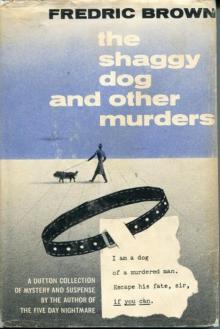 The Shaggy Dog and Other Murders
The Shaggy Dog and Other Murders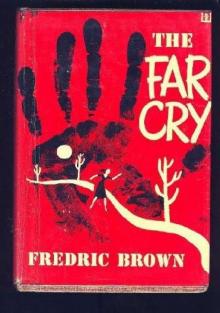 The Far Cry
The Far Cry Arena
Arena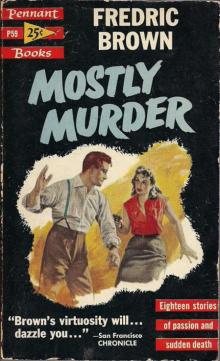 Mostly Murder
Mostly Murder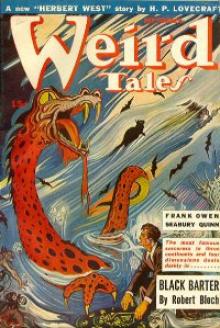 The Geezenstacks
The Geezenstacks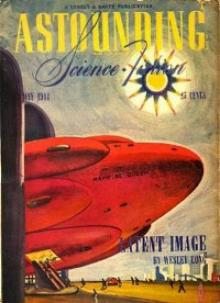 The Yehudi Principle
The Yehudi Principle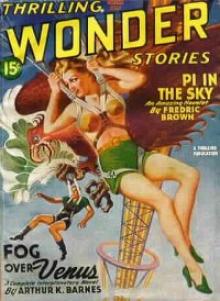 Pi in the Sky
Pi in the Sky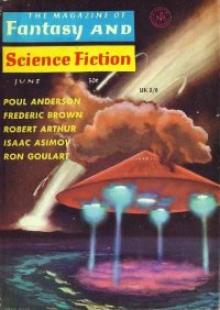 Eine Kleine Nachtmusik
Eine Kleine Nachtmusik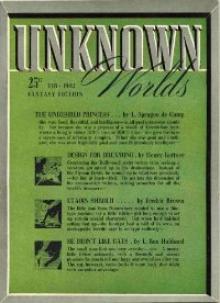 Etaoin Shrdlu
Etaoin Shrdlu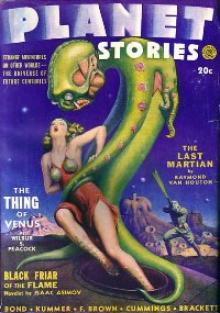 The Star Mouse
The Star Mouse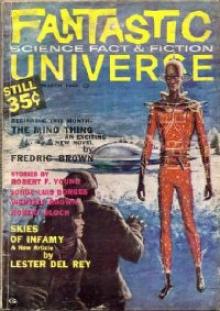 The Mind Thing
The Mind Thing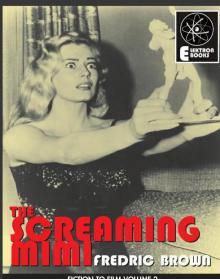 The Screaming Mimi
The Screaming Mimi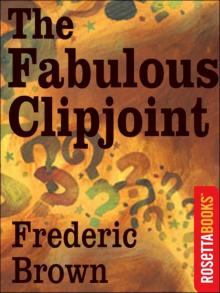 The Fabulous Clipjoint
The Fabulous Clipjoint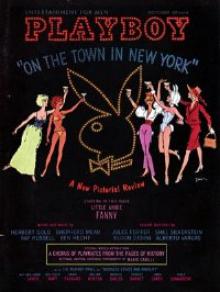 Puppet Show
Puppet Show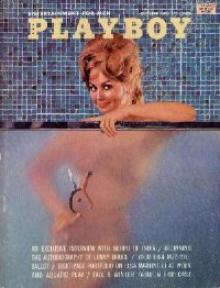 It Didn't Happen
It Didn't Happen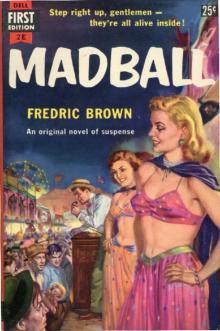 Madball
Madball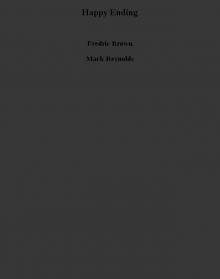 Happy Ending
Happy Ending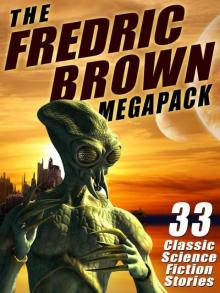 The Fredric Brown Megapack: 33 Classic Science Fiction Stories
The Fredric Brown Megapack: 33 Classic Science Fiction Stories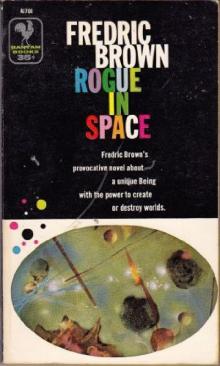 Rogue in Space
Rogue in Space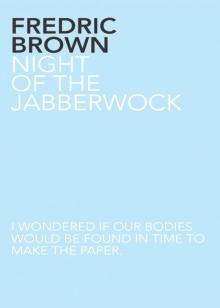 Night of the Jabberwock
Night of the Jabberwock The Dead Ringer
The Dead Ringer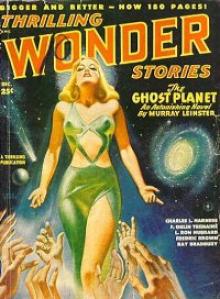 Knock
Knock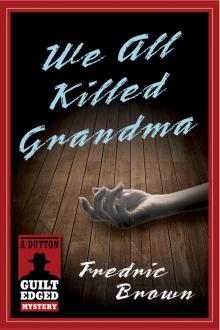 We All Killed Grandma
We All Killed Grandma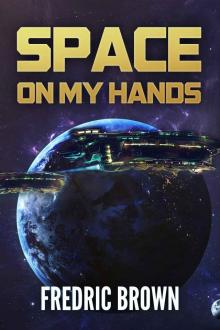 Space On My Hands
Space On My Hands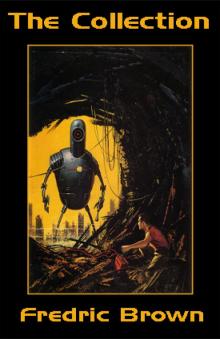 The Collection
The Collection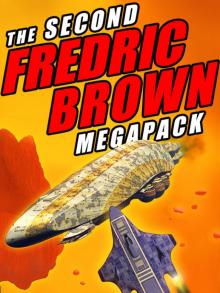 The Second Fredric Brown Megapack: 27 Classic Science Fiction Stories
The Second Fredric Brown Megapack: 27 Classic Science Fiction Stories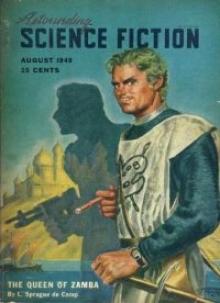 Letter to a Phoenix
Letter to a Phoenix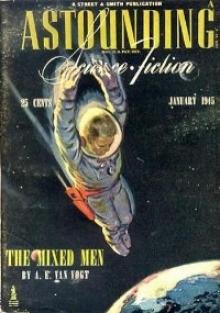 The Waveries
The Waveries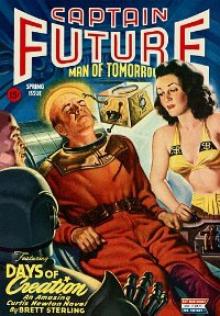 Nothing Sirius
Nothing Sirius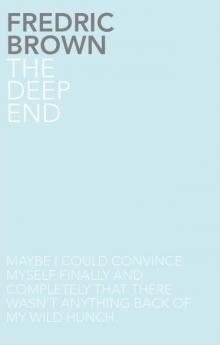 The Deep End
The Deep End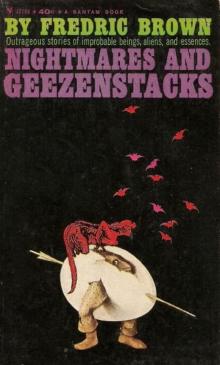 Nightmares & Geezenstacks
Nightmares & Geezenstacks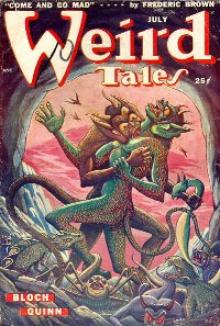 Come and Go Mad
Come and Go Mad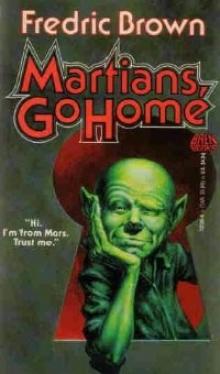 Martians, Go Home
Martians, Go Home